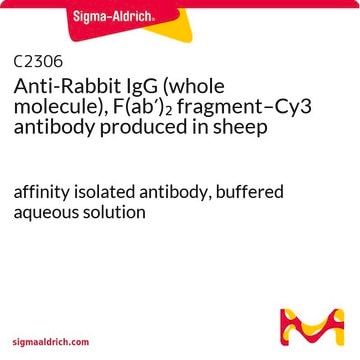F1262
Anti-Rabbit IgG (whole molecule), F(ab′)2 fragment–FITC antibody produced in goat
affinity isolated antibody, buffered aqueous solution
About This Item
Productos recomendados
biological source
goat
conjugate
FITC conjugate
antibody form
affinity isolated antibody
antibody product type
secondary antibodies
clone
polyclonal
form
buffered aqueous solution
technique(s)
indirect immunofluorescence: 1:40
storage temp.
2-8°C
target post-translational modification
unmodified
General description
Anti-Rabbit IgG (whole molecule), (F(ab′)2) fragment-FITC is specific for all rabbit immunoglobulins. The use of this product prevents background staining due to the presence of Fc receptors.
Fluorescein isothiocyanate (FITC) is a fluorescein derivative (fluorochrome) used to tag antibodies, including secondary antibodies, for use in fluorescence-based assays and procedures. FITC excites at 495 nm and emits at 521 nm.
Immunogen
Application
Physical form
Disclaimer
¿No encuentra el producto adecuado?
Pruebe nuestro Herramienta de selección de productos.
Storage Class
10 - Combustible liquids
wgk_germany
nwg
flash_point_f
Not applicable
flash_point_c
Not applicable
Certificados de análisis (COA)
Busque Certificados de análisis (COA) introduciendo el número de lote del producto. Los números de lote se encuentran en la etiqueta del producto después de las palabras «Lot» o «Batch»
¿Ya tiene este producto?
Encuentre la documentación para los productos que ha comprado recientemente en la Biblioteca de documentos.
Nuestro equipo de científicos tiene experiencia en todas las áreas de investigación: Ciencias de la vida, Ciencia de los materiales, Síntesis química, Cromatografía, Analítica y muchas otras.
Póngase en contacto con el Servicio técnico








